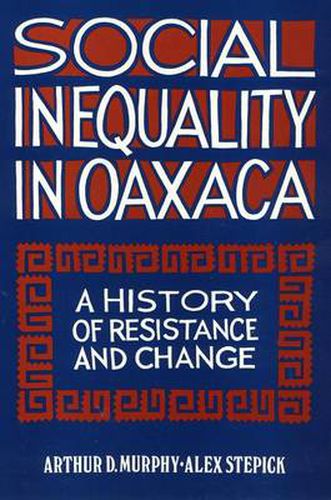Readings Newsletter
Become a Readings Member to make your shopping experience even easier.
Sign in or sign up for free!
You’re not far away from qualifying for FREE standard shipping within Australia
You’ve qualified for FREE standard shipping within Australia
The cart is loading…






This may be the only book that analyzes the urbanization of one area from its origins more than two thousand years ago to the present. Arthur Murphy and Alex Stepick examine Oaxaca, Mexico, where they have been doing research regularly for the last twenty years. Paying particular attention to neighborhoods, families, and economic activities, they focus on issues of poverty and inequality. Oaxaca is a city marked by socioeconomic inequality that has felt the alternating trends of integration into and isolation from the broader world. It is a city in which tens of thousands of households resolutely try to adapt, to survive and pass on something of themselves to their children. With rich ethnographic material and historical research, Murphy and Stepick describe gender roles, the dynamic nature of households, the importance of compadrazgo (co-godparenthood) as a social institution, class-based political struggles and strikes, and the role of children in redeeming their parents from poverty. Individual life histories emerge from their research, each representing diverse class, familial, and economic structures within Oaxacan society. Arthur D. Murphy is Associate Professor of Anthropology at Georgia State University. Alex Stepick is Associate Professor of Anthropology at Florida International University.
$9.00 standard shipping within Australia
FREE standard shipping within Australia for orders over $100.00
Express & International shipping calculated at checkout
This may be the only book that analyzes the urbanization of one area from its origins more than two thousand years ago to the present. Arthur Murphy and Alex Stepick examine Oaxaca, Mexico, where they have been doing research regularly for the last twenty years. Paying particular attention to neighborhoods, families, and economic activities, they focus on issues of poverty and inequality. Oaxaca is a city marked by socioeconomic inequality that has felt the alternating trends of integration into and isolation from the broader world. It is a city in which tens of thousands of households resolutely try to adapt, to survive and pass on something of themselves to their children. With rich ethnographic material and historical research, Murphy and Stepick describe gender roles, the dynamic nature of households, the importance of compadrazgo (co-godparenthood) as a social institution, class-based political struggles and strikes, and the role of children in redeeming their parents from poverty. Individual life histories emerge from their research, each representing diverse class, familial, and economic structures within Oaxacan society. Arthur D. Murphy is Associate Professor of Anthropology at Georgia State University. Alex Stepick is Associate Professor of Anthropology at Florida International University.